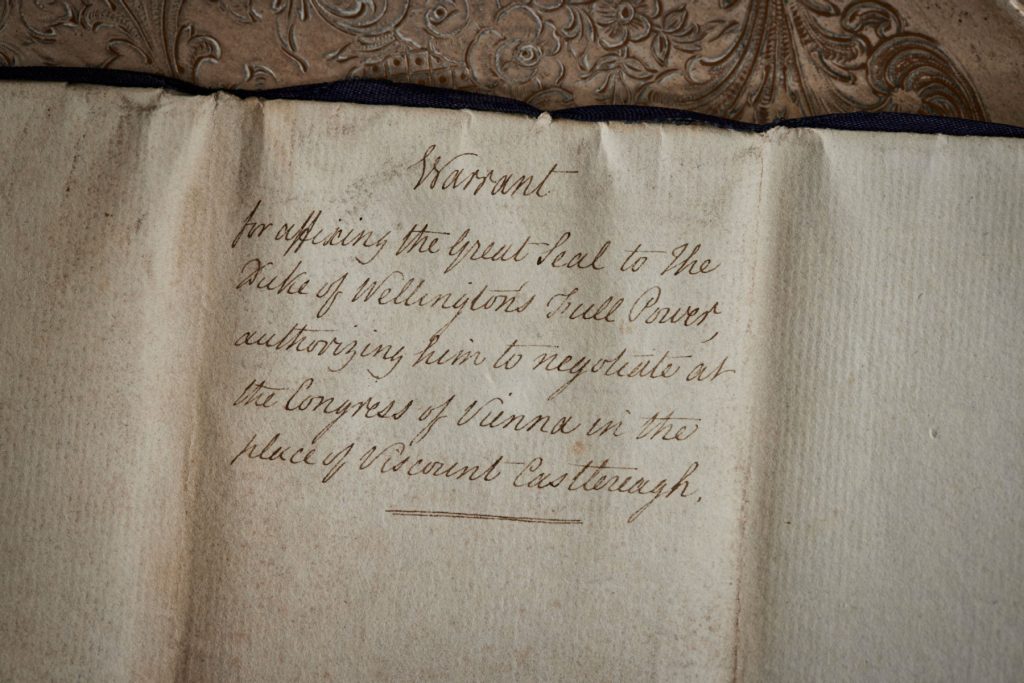The Original Appointment of the Duke of Wellington to Negotiate at the Congress of Vienna, Which Established the European Balance of Power for a Century, Signed by Future King George IV




An appointment of great importance; he would leave the Congress to fight Napoleon, escaped from Elba, ending at the Battle of Waterloo
- Currency:
- USD
- GBP
- JPY
- EUR
- CNY
By 1792 the French Revolution was in the hands of its radicals, and the other governments in Europe were convinced they had to intervene to prevent its spread. They invaded France, thus commencing a war that would not end for well over two decades. By its close, France, led by Napoleon, had...
By 1792 the French Revolution was in the hands of its radicals, and the other governments in Europe were convinced they had to intervene to prevent its spread. They invaded France, thus commencing a war that would not end for well over two decades. By its close, France, led by Napoleon, had conquered (at one time or another) much of the continent, and spread its influence pervasively throughout. Virtually no aspect of life in Europe was unaffected by what came to be called the Napoleonic Wars. Finally, on March 31, 1814, the Allied forces entered Paris, compelling Napoleon to abdicate and go into exile at Elba.

The hostilities were suspended by a convention signed on April 23, and on May 30 the Treaty of Paris was signed ending the state of war. But this was just the start. The victorious European powers determined to reestablish, as far as possible, the order and borders in force in 1792, and to resolve the many other problems that had arisen during revolution and war. They called the Congress of Vienna, which started on September 27, 1814. The Congress proved to be the most important international conference in European history, at least until the Versailles Conference in 1919. Although these representatives wanted what was best for their own countries, they followed one fundamental principle: in order to prevent another major war, they wished to create a European ‘balance of power’ which would prevent any one nation from being able to again dominate the continent. The settlement that resulted accomplished this crucial goal, and was the first conference that foresaw what was essentially a European Union.
Wellington had been appointed Ambassador to Paris after the abdication of Napoleon in 1814, but the weakness and instability of the restored Bourbon monarchy was such that by the autumn of that year the British government feared for his safety. Lord Castlereagh had been the initial representative of Great Britain at the Congress of Vienna until early 1815, when he had to return to his parliamentary duties. Wellington was chosen to replace him and reached Vienna on February 3, 1815. He was there on March 7 when news reached the city that Napoleon had escaped from Elba. A new coalition was hastily formed, and Wellington was soon heading west to Brussels and, ultimately, Waterloo. The Congress of Vienna continued to meet throughout the Hundred Days and the final agreement was signed on June 9, 1815. It was the most comprehensive treaty that had ever been agreed in Europe up to that time.

This is Wellington’s original appointment to negotiate a new European balance of power at Vienna. Document signed “George PR”, at the head, addressed to the Lord Chancellor Lord Eldon, January 18, 1815, authorizing “Full Power to our Right Trusty and Right Entirely Beloved Cousin and Councillor Arthur Duke of Wellington … constituting and appointing him His Majesty’s First Commissioner and Plenipotentiary at the Congress at Vienna”, also signed at the foot by the Secretary of War Lord Bathurst, with a copy of the 9 page instrument itself attached, papered seal, stab-stitched with blue ribbon, altogether 11 pages. George signed PR (Prince Regent) from the time his father became insane and he was named to act for him in 1811, until the time he himself became King in 1820.

Frame, Display, Preserve
Each frame is custom constructed, using only proper museum archival materials. This includes:The finest frames, tailored to match the document you have chosen. These can period style, antiqued, gilded, wood, etc. Fabric mats, including silk and satin, as well as museum mat board with hand painted bevels. Attachment of the document to the matting to ensure its protection. This "hinging" is done according to archival standards. Protective "glass," or Tru Vue Optium Acrylic glazing, which is shatter resistant, 99% UV protective, and anti-reflective. You benefit from our decades of experience in designing and creating beautiful, compelling, and protective framed historical documents.
Learn more about our Framing Services












































































































